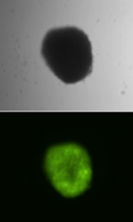Gene therapy for metabolic liver diseases shows promise in pigs
With a shortage of donor organs, Mayo Clinic is exploring therapeutic strategies for patients with debilitating liver diseases. Researchers are testing a new approach to correct metabolic disorders without a whole organ transplant.
The medical research study tested gene therapy in pigs suffering from hereditary tyrosinemia type 1 (HT1), a metabolic disorder caused by an enzyme deficiency. The common treatment for this disease is a drug regimen, but it is ineffective in many patients, and the long-term safety of using the drug is unknown.
"Liver transplant is the only curable option in treating HT1, which is characterized by progressive liver disease," says Raymond Hickey, Ph.D., a Mayo surgical researcher. "Using this novel approach to treat HT1 and other metabolic diseases will allow patients to avoid a liver transplant and save more lives."
Through gene therapy, the corrected liver cells are transplanted into the diseased liver, resulting in enzyme production. "This treatment is a new form of cell transplantation that utilizes the patient's own cells, so it does not require immunosuppressive drugs and, thus, avoids the side effects of those drugs," says Scott Nyberg, M.D., Ph.D., a liver transplant surgeon at Mayo Clinic. This therapy resulted in the improvement of pigs with HT1 and the prevention of liver failure. The use of nuclear imaging enables the researchers to monitor expansion of the corrected cells through a noninvasive imaging process.
"Pediatric patients suffering from inborn errors of metabolism of the liver will benefit most from this therapy," says Dr. Hickey. "More than one-fifth of all pediatric liver transplants are a result of metabolic disease."
The study also examines the use of lentiviral vectors for cell delivery in treating liver diseases, a tool traditionally used in treating blood disorders.
Original publication
Other news from the department science
Most read news
More news from our other portals
See the theme worlds for related content
Topic world Gene therapy
Genetic diseases once considered untreatable are now at the center of innovative therapeutic approaches. Research and development of gene therapies in biotech and pharma aim to directly correct or replace defective or missing genes to combat disease at the molecular level. This revolutionary approach promises not only to treat symptoms, but to eliminate the cause of the disease itself.

Topic world Gene therapy
Genetic diseases once considered untreatable are now at the center of innovative therapeutic approaches. Research and development of gene therapies in biotech and pharma aim to directly correct or replace defective or missing genes to combat disease at the molecular level. This revolutionary approach promises not only to treat symptoms, but to eliminate the cause of the disease itself.























































